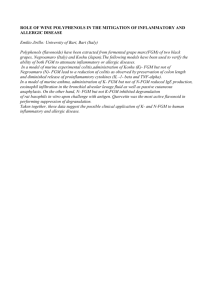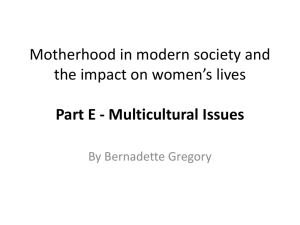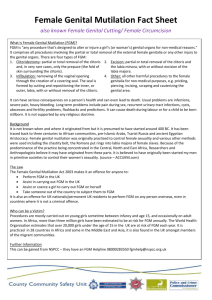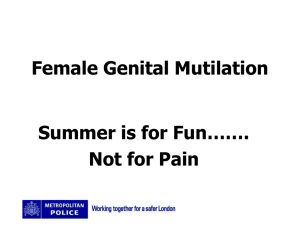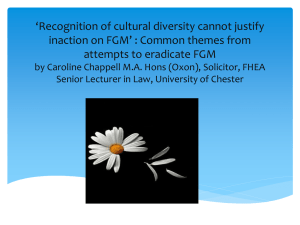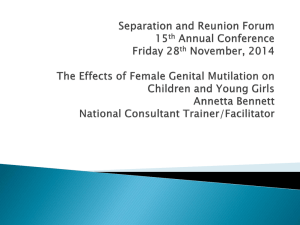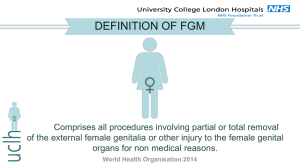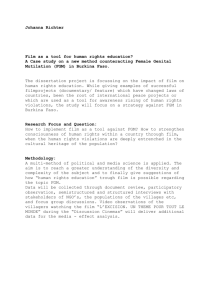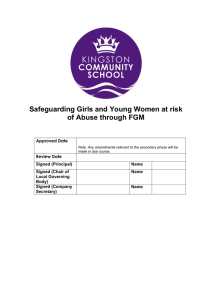A Statement Opposing Female Genital Mutilation June 2015
advertisement
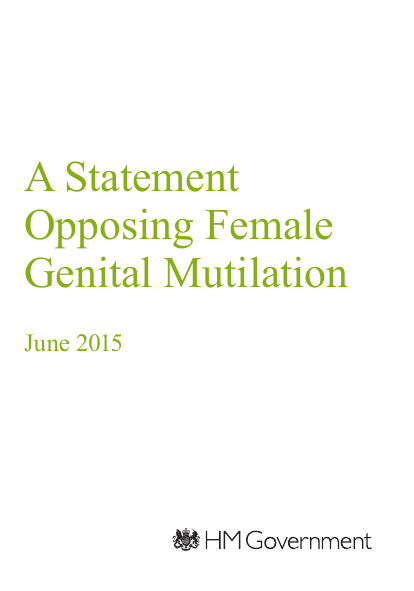
A Statement Opposing Female Genital Mutilation June 2015 Female Genital Mutilation (FGM) is child abuse and an extremely harmful practice with devastating health consequences for girls and women. Some girls die from blood loss or infection as a direct result of the procedure. Some women who have undergone FGM are also likely to find it difficult to give birth and many also suffer from longterm psychological trauma. penalty of 14 years in prison for anyone found guilty. Your parents, or whoever is caring for you, may also be guilty of an offence if they fail to protect you from FGM being carried out. What this statement is for: You mutilation of the external female genitalia for non-medical reasons. It is sometimes known as female circumcision or ‘sunna’. should take this statement with you when you go abroad. You can show it to your family. This makes it clear that FGM is a serious criminal offence in the UK with a maximum Keep this statement safe: You should carry it with you at all times - especially when you go abroad. What is FGM: FGM is the UK law: FGM is a crime in the UK1. • Even if someone is taken overseas to undergo FGM, it is still a crime in the UK if the mutilation is done by a UK national or a UK resident. • It is also a crime if a UK national or resident assists or gets a non-UK national or resident to carry out FGM overseas on a UK national or resident 1 In England, Wales and Northern Ireland, the practice is illegal under the Female Genital Mutilation Act 2003. In Scotland it is illegal under the Prohibition of Female Genital Mutilation (Scotland) Act 2005. • And if FGM is committed against a girl under the age of 16, each person who is responsible for the girl at the relevant time is guilty of an offence2. Criminal Penalties: Anyone found guilty of an FGM offence - or of helping somebody commit one faces up to 14 years in prison, a fine, or both. Anyone found guilty of failing to protect a girl from risk of FGM faces up to 7 years in prison, a fine, or both. 2 In England, Wales and Northern Ireland. Help and support: If you are worried that this may happen to you or someone you know, you can speak in confidence to a teacher, doctor, school nurse, social worker, police officer or any health, educational or social care professional. They will be able to help, support and protect you. If you are a victim of FGM and report it to the police, you will be given lifelong anonymity from the time an allegation is made. This means that no information may be published that could identify you as a victim of FGM, even if there is no eventual court case. If you are in the UK and are concerned that you may be taken overseas for the purpose of FGM please call the police by dialling 999. If you are abroad and require help or advice please call the Foreign and Commonwealth Office on +44 (0) 20 7008 1500 You can also access help and support from: NSPCC FGM Helpline: 0800 028 3550 Email: fgmhelp@nspcc.org.uk Childline Tel: 0800 1111 www.childline.org Equality Now (in Nairobi, Kenya and London, UK) Tel (London): +44(0) 20-7304 6902 Tel (Nairobi): + 254 20-271-9832 www.equalitynow.org Ministerial Signatures: This statement is supported by: Karen Bradley MP Minister of State for Preventing Abuse and Exploitation, Home Office Mike Penning MP Minister of State for Policing, Crime, Criminal Justice and Victims, Ministry of Justice Jane Ellison MP Parliamentary Under Secretary of State, Department of Health Edward Timpson MP Minister of State for Children and Families, Department for Education Baroness Verma Parliamentary Under-Secretary of State for International Development This statement is also supported by the Crown Prosecution Service: Alison Saunders QC Director of Public Prosecutions (DPP), Crown Prosecution Service (CPS) © Crown copyright 2015 When you have finished with this publication please recycle it
